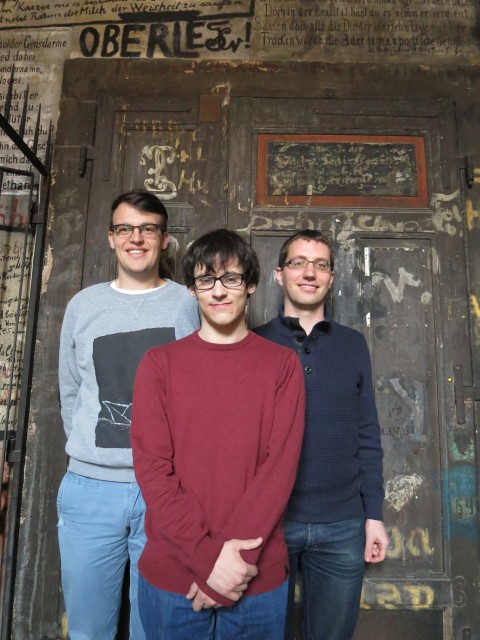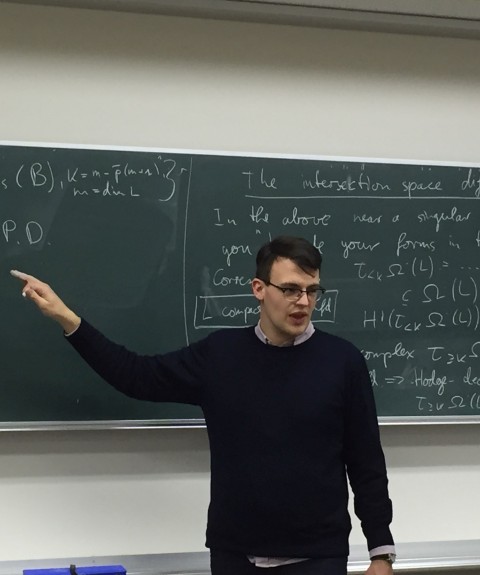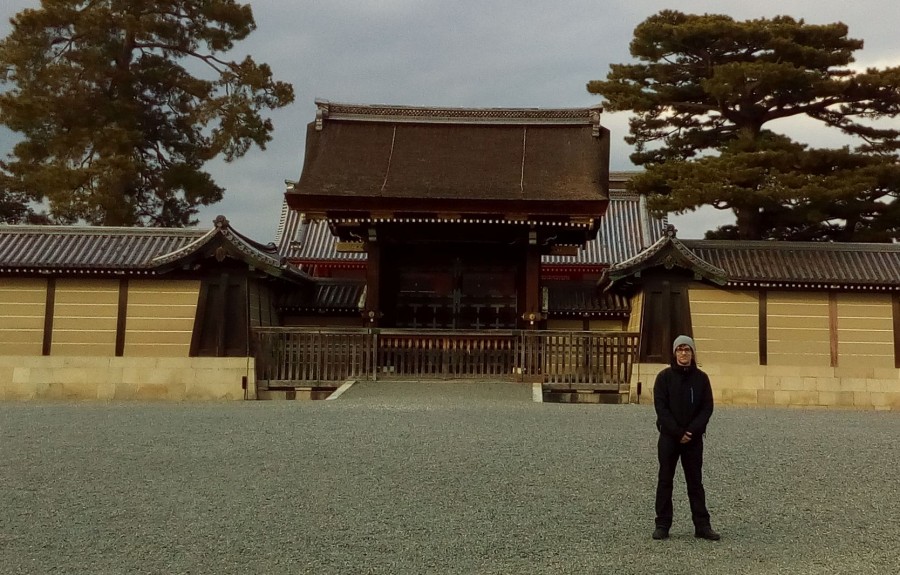Internship Programme within the Framework of HeKKSaGOn 2016
Until March 2016 the Ph.D. students Francesco Silvestri (Heidelberg University), Timo Essig (Heidelberg University) and Michael Färber (Karlsruhe Insitute for Technology, KIT) took part in an Internship Programme within the Framework of HeKKSaGOn. The Internship Programme aims to promote foreign language and different cultural studies for students of Kyoto University utilizing the HeKKSaGON Consortium by inviting German researchers among three universities in Germany to Kyoto University for several weeks.
As part of the Programme Francesco, Timo and Michael assisted in a project for developing digital teaching materials in German for Kyoto University students coordinated by Professor Masatake Dantsuji and Associate Professor Hiroki Nanjo utilizing the multimedia equipment of the Academic Center for Computing and Media Studies in Kyoto University. During their time in Kyoto they also had the chance to experience the university life in Japan and provide information about German university life to Japanese exchange students. Moreover it was possible for them to research together with researchers from Kyoto University and even lecture in their specific field of study.
Interview with Internship Programme Participants
In an Interview after their return Francesco, Timo and Michael shared some of their experiences and impression of their time at the Kyoto University and their daily life in Japan.
 Timo Essig (left), Franceso Silvestri (middle), Michael Färber (right) |
 Timo Essig lecturing at Kyoto University |
Why did you apply for this project?
Francesco:
I applied because I wanted to experience Japan, get a better understanding of Japanese culture and meet Japanese people. I’ve been interested in Japanese Media like Anime, Manga and Video games since I was a child and I recently started studying Japanese. Besides the things that were imported to Europe I wanted to get a deeper understanding about Japan. I’m also thinking about working in Japan in the future and so I wanted to get an impression of how Japanese people work etc.
Timo:
My case is similar to Francescos. I’ve been interested in Japanese culture for a long time. I really wanted to go to Japan and get a personal impression about it. And since I finished writing my Ph.D. the timing was good. So I could take off two weeks from the usual day-to-day research before getting started with a new topic.
Michael:
For me the reasons were almost the same. The first reason for applying was to meet Japanese people and to get a glimpse of Japan. The second reason concerns my research. I wanted to know, if there were researchers at the Kyoto University, who work in my field and with whom I could cooperate. I gave several presentations and found one associate professor whose research is close to mine. I’m not sure if we will write a paper or work on a project together.
What is your favorite memory about the Kyoto University?
Timo:
First and foremost, I remember the friendliness of the people. I think in Germany there is a wide gap between professors and other people. In Japan I got to know especially two professors who talked to me like I was equal to them and I didn’t felt that kind of a gap. For example I had the chance to give a lecture at the Kyoto University and I got an invitation for dinner by one of the professors. For the professor being a host this might also have happened in Germany. But on my way home, he brought me to the bus stop. As we came closer we saw that my bus was already approaching the bus stop and I feared that it would depart before I got there. As I was running to get the bus, the professor was also running with me. I can’t imagine that to happen in Germany. I was really surprised.
Michael:
In Japan people are very helpful. In Europe you have to care for yourself on a lot of occasions.
(In an earlier meeting you told us you thought that Japanese people are stiff, somehow distant and very concentrated at their workplace. But then you said, you were surprised by the relaxed atmosphere and the support by the people.)
Francesco:
Yes. This is how Japan is depicted in media and game shows in Germany. I think it’s difficult to get a real impression through those.
Timo:
In Europe, especially in Germany, there are a lot of occasions were you have to deal with a lot of things yourself. Even if you’re invited as a guest, you have to find your way around yourself and nobody would consider help you. For example I can’t imagine that somebody would look up the most convenient bus for you, bring you to the bus stop and wait there together with you.
What do you think about the Kyoto University?
Timo:
The Kyoto University is great because the research subjects of the work group members are very diverse. Even though the topics and subjects of the researchers are fairly different, they work together in the same work group. I think it’s very good that people attend to lectures even if these are not directly connected with their own research topics. In my case I didn’t get to know Francesco before this project even though we both study Mathematics at the same institute. It is hard to get to know students from your own field of study.
Michael:
I have the same impression, since KIT is a big university as well. But if you study at a smaller University like the one Ulm, where I studied, you basically get know every person connected to your subject.
(Both of you, Michael and Timo, gave a lecture at Kyoto University. Was there any difference to giving a lecture in Germany? What was your impression of the question and answer session?)
Michael:
I had a chance to give a lecture in a seminar for M.A. and PhD-students and I don’t think it was different from my lecture in Germany. Since the content that has to be taught in Europe and Germany piles up and you have to have to advance step by step it is necessary for the lecturer to ask the questions. In the case of my lecture in Kyoto, there were a lot of question asked, but there were no Japanese students. When I asked for the reason, I was told that they think that they would not be able to follow the lecture because of lacking English language proficiency. So most of the contacts I made where exchange students from Russia and Italy who could speak English.
Timo:
I think my lecture was similar to those in Germany. But since my topic is plain math and it’s not unusual in Heidelberg that there are seminars with only 2 to 3 students attending, I was surprised that there where almost 15 people at my lecture in Kyoto. So it would not have been a problem if there were not so many people in the lecture about a topic which I was interested in. In my lecture there were Japanese students and they asked questions.
What do you think about the City of Kyoto?
Michael:
The huge amount of historic building not to mention shrines was very impressing. Also I was surprised by the mixture of shops and shrines, which were so close together.
Francesco:
Initially I thought so as well, but if you think about cathedrals, churches and castles you also find that in Germany as well. Since you get used to this you will hardly notice. Because of the different scenery and the fact that there are no temples and shrines in Germany it is standing out. If you come to Germany as a foreigner you might feel same. Michael: I agree. Especially in Heidelberg that is the case.
Timo:
But what you won’t find in Germany are shopping streets like Teramachi-dori and Shinkyogyoku-dori where you find shrines that are right next small shops. Also if you think about Japanese houses, temples are extremely huge. Compared to Germany Japanese houses are very small.
What influence could this experience have on you as young researchers as yourselves?
Timo:
You could surely build networks with researchers at Kyoto University. Unfortunately there was no one who did research that corresponded completely with my research topic, but I got an insight into many new fields of research, which had a great impact on me. Therefore there is still a lot for me to think about. Mathematics is a field of study, which is very time consuming. It takes at least half or one year until you are able to advance into a new field and investigate its potential. As a result of this, I think it would probably be better to apply for a Postdoc position in order to be able to judge if you want to go further into a new topic.
Michael:
I agree with that. I don’t know what the immediate results of this experience will be. But I could meet researchers at the Kyoto University, which work on my topic or close to it. Maybe there will be some sort of collaboration or a joint paper in the future, but I’m not sure about this now. At least from now on I know about the potential of the JSPS Programs and HeKKSaGOn.
Francesco:
As the others said, it might be difficult to do a Postdoc at the Kyoto University since the research topics there may not correspond with one’s own research. But that put aside, I would certainly take the chance to go to Japan as part of a research exchange. I will search for such opportunities in the future. ■



